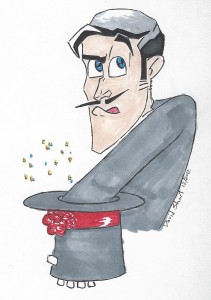Fooling Houdini: Magicians, Mentalists, Math Geeks, and the Hidden Powers of the Mindby Alex Stone was a very enjoyable read. I found it similar to Moonwalking with Einstein: The Art and Science of Remembering Everything
by Joshua Foer. Surprisingly, later in the book I read that Alex had consulted with Joshua about memorization techniques that played a part in a trick that Alex was developing. Both books are authored by freelance journalists that are writing about their journey through the personalities and techniques of rich worlds unknown to most people. (Maybe calling Alex a journalist is not accurate, but he has written for a number of periodicals. He is also (or was also) a Physics PhD student, and of course a Magician)
At first I thought that this book would reveal magic secrets behind the various magical professionals mentioned in the subtitle, but he only shares the techniques behind two of his own tricks. This book is more about the craft and history of magic.
He starts out describing how he got more and more involved in the magic community. Early in the book he made his way to the exclusive Magic Olympics where he failed miserably. He gave magic up after that for several months, but then started back, learning the discipline of Magic as an apprentice, instead of superficially learning the tricks of the trade.
It was revealing how he first met Wesley “Wes” James, a gruff magic veteran and patriarch who held court in the dining room of a pizza joint. Alex brought with him a copy of S. W. Erdnase’s “The Expert at the Card Table”, a card cheater’s bible, hoping to impress Wes. Despite Alex’s naivete, Wes was willing to mentor him.
Alex shows his own shortcomings throughout the book. For example, he foolhardily attempts to make the acquaintance of some “Three Card Monte” card sharks in a rough New York neighborhood. He writes an article in Harpers that reveals not only one of his tricks, but also that of a trick each of two of his fellow competitors at the Magic Olympics. His admits that his was an ill-advised attempt at raising respect for the field of magic by opening up a view into the craft of Magic. He was duly sorry for the attempt and we see his agony and distress when the Society of American Magicians asked for his resignation. (I will let you read to find out how that worked out)
Alex is torn as he becomes less connected to his graduate studies and more enmeshed in in the craft and science of Magic, and its history.
In his book he covers the gamut from Mentalists to Con Artists. It is fascinating reading, though I was not so impressed by his classifying religious figures such as Jesus Christ as practitioners of magic.
Alex shows some misgivings when he dabbled in the more disreputable side of Magic. He manipulates the deck during a friendly poker game just to see if he could get away with it. It was not strictly cheating because his actions did not specifically benefit anyone. He just dealt from the bottom or middle of the deck amongst other sleights. He was even more troubled by his experience of performing mind reading tricks. People were so easily swayed by the tricks and even when told how he managed to guess personal knowledge, still thought that something of the occult was going on.
Alex reviews how human nature has a lot of mental biases that affect everything we do. As an example, clinical drug studies need to be specially designed to sidestep human limitations.
I gained new respect for the craft of magic because it becomes obvious just how talented and devoted these Magicians are. Such as Richard Turner who, though almost completely blind can astound even seasoned magicians with his card handing skills. Richard estimates that he has shuffled decks of cards in the tens of millions of times. He even has a special blank all-white deck that his wife lets him shuffle while sitting in church.
This book also relates to another that I am currently reading. “The Talent Code: Greatness Isn’t Born. It’s Grown. Here’s How”.The repeated exact practicing that the magicians perform is the same concept that we need to follow to raise our skills to a new level.
We follow Alex as he bulks up for a International Brotherhood of Magic (IBM) competition, even following the exercise regimen of “Finger Fitness: the Art of Finger Control”. This time he does not return humiliated.
If you have read Fooling Houdini: Magicians, Mentalists, Math Geeks, and the Hidden Powers of the Mind please let me know what you thought. An thanks to all that use my Affiliate Amazon Link for your shopping pleasure.







